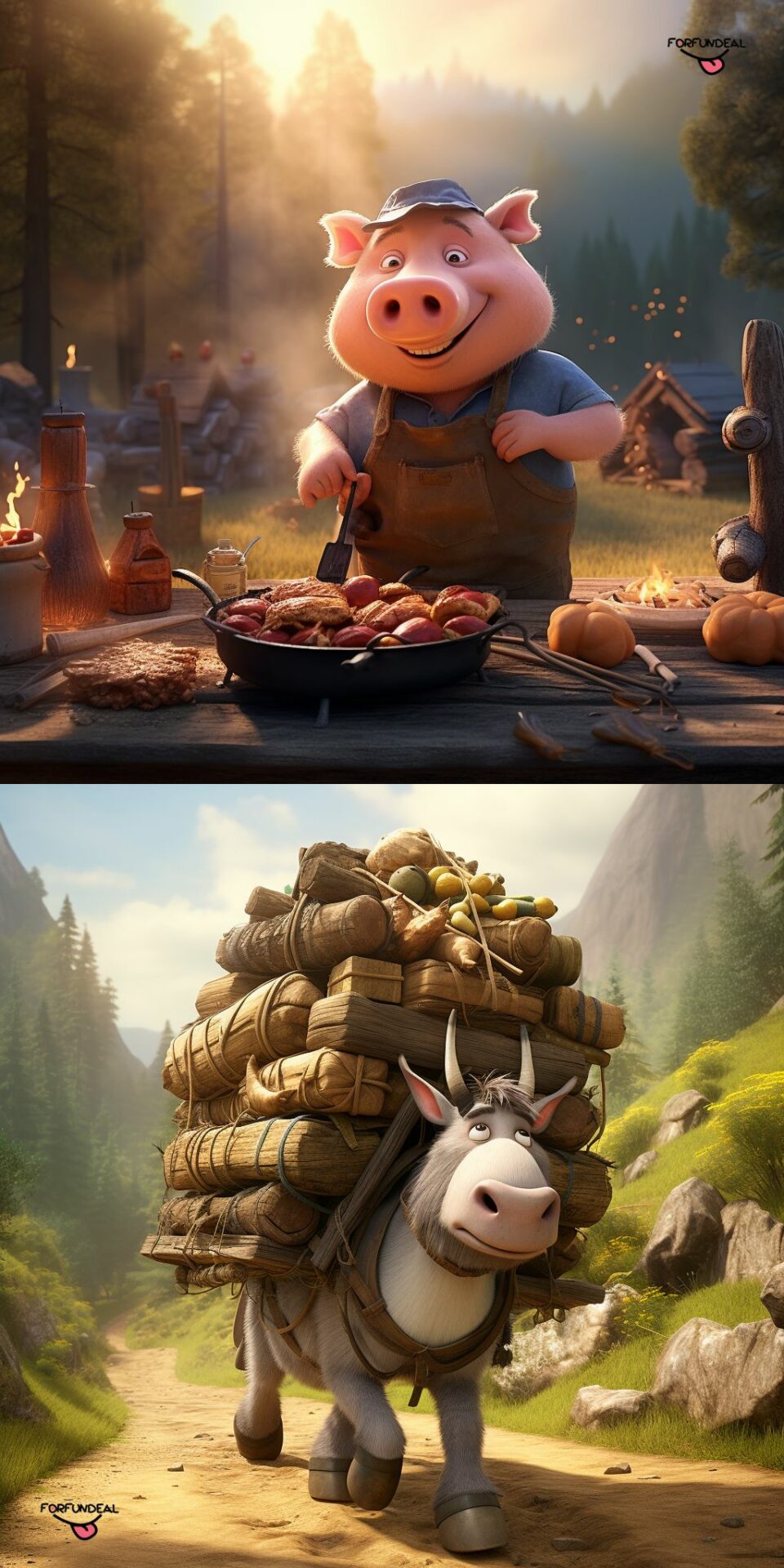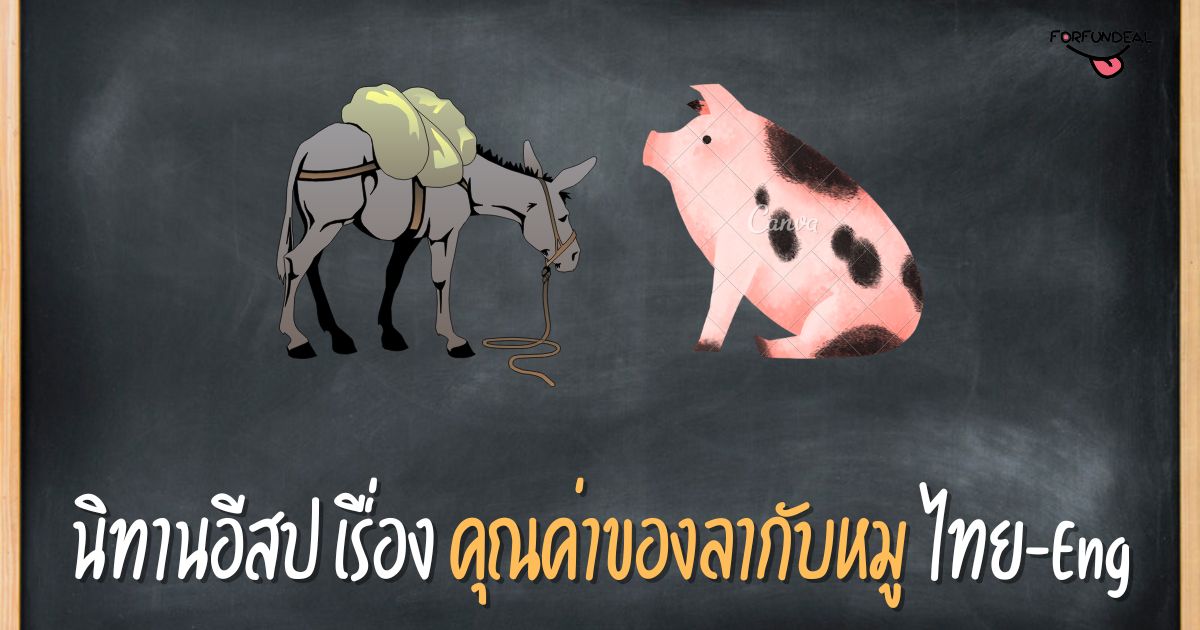“คุณค่าของลากับหมู” เป็นนิทานอีสปที่สอนเราให้รู้จักคุณค่าของสิ่งที่สัตว์มอบให้กับเรา เพื่อให้เราหล่อเลี้ยงชีวิตของเรา และสอนให้เรารู้จักหน้าที่ของตนเอง
นิทานอีสปเรื่องคุณค่าของลากับหมู
กาลครั้งหนึ่งนานมาแล้ว ในชนบทอันเงียบสงบ ลากับหมูเป็นเพื่อนบ้านกัน พวกมันมักจะใช้เวลาไปกับการเล็มหญ้าและพูดคุยกัน แม้จะมีความแตกต่าง แต่พวกมันก็มีมิตรภาพที่แน่นแฟ้น วันหนึ่ง ขณะที่พวกมันกำลังพักผ่อนอยู่ในที่ร่ม ลาเริ่มโอ้อวดเกี่ยวกับความสำคัญของมันในฟาร์ม
One upon time, In a serene countryside, an ass and a pig were neighbors. They often spent their days grazing and chatting together. Despite their differences, they had a strong friendship. One day, as they were relaxing in the shade, the ass began to boast about his importance on the farm.
“ข้าเป็นกระดูกสันหลังของฟาร์มนี้อย่างแท้จริง” ลาพูดอย่างภาคภูมิใจ “ข้าแบกของหนัก ไถนา และทำงานหนักทุกอย่าง ชาวนาพึ่งพาข้าทุกอย่าง”
“I am truly the backbone of this farm,” the ass declared proudly. “I carry heavy loads, plow the fields, and do all the hard work. The farmer relies on me for everything.”
หมูฟังอย่างสนุกสนานและตอบว่า “อืม เพื่อนรัก เจ้ามีบทบาทสำคัญจริงๆ อย่างไรก็ตาม อย่าลืมว่าข้าก็ให้เนื้อและไส้กรอกอร่อยๆ แก่ชาวนา เขาให้ความสำคัญกับข้ามากเท่าๆ กัน”
The pig listened with amusement and replied, “Well, my dear friend, you do play an important role indeed. However, don’t forget that I provide the farmer with delicious meat and sausages. He values me just as much.”
ลาหัวเราะเบาๆ ปฏิเสธคำกล่าวอ้างของหมู “แต่จำไว้นะ” ลาพูดด้วยรอยยิ้ม “ชาวนาดูแลข้าทุกวัน ไม่ช้าก็เร็ว เจ้าจะต้องจบลงบนโต๊ะอาหารของเขา”
The ass chuckled, dismissing the pig’s claim. “But remember,” the ass said with a grin, “the farmer cares for me every day, while you’ll end up on his dinner table sooner or later.”
หมูไม่สะทกสะท้านกับความคิดเห็นของลาเลย ตอบอย่างใจเย็นว่า “จริงอยู่ ชะตากรรมของข้าอาจแตกต่างจากคุณ แต่ในขณะที่เจ้าก็ทำงานหนักมาทั้งชีวิต”
The pig, unfazed by the ass’s comment, replied calmly, “True, my fate might be different from yours. But while you work hard all your life, I get to enjoy the pleasures of life right now.”
เวลาผ่านไปวันหนึ่งชาวนาตัดสินใจขายลาให้กับพ่อค้า ลาถูกบรรทุกด้วยถุงหนักๆ และส่งไปยังสถานที่ใหม่ ห่างจากฟาร์มและหมูเพื่อนของมัน
Time went by, and one day, the farmer decided to sell the ass to a trader. The ass was loaded with heavy bags and sent off to a new place, away from the farm and his friend, the pig.
หมูยังคงสนุกกับชีวิตสบายๆ ในฟาร์ม แช่โคลนและลิ้มรสเศษอาหารแสนอร่อยที่ชาวนามอบให้ มันอดไม่ได้ที่จะคิดถึงลาและชะตากรรมของเขาที่พามันไปสู่เส้นทางอื่น
The pig continued to enjoy his leisurely life on the farm, soaking in the mud and savoring the delicious scraps the farmer gave him. He couldn’t help but think about the ass and how his destiny had led him down a different path.

นิทานเรื่องนี้สอนให้รู้ว่า
“บางครั้ง การมีความสุขกับปัจจุบัน ย่อมดีกว่าการโอ้อวดถึงอนาคต”
- หญ้าไม่ได้เขียวกว่าในอีกด้านหนึ่งเสมอไป: เรื่องราวแสดงให้เห็นว่าทั้งลาและหมูต่างมีบทบาทและคุณค่าของตัวเอง สิ่งที่ดูเหมือนเป็นที่ต้องการมากกว่าจากภายนอกอาจมาพร้อมกับความท้าทายและการเสียสละของมันเอง
- พอใจในหน้าที่ของตน: หมูพอใจกับชีวิตปัจจุบันของมัน พอใจในความสุขที่มันนำมา ทำหน้าที่เป็นเครื่องเตือนใจว่าการพอใจกับสถานการณ์ของตนเองสามารถนำไปสู่ชีวิตที่มีความสุขและสมบูรณ์ยิ่งขึ้น
- ชื่นชมการมีส่วนร่วมที่แตกต่างกัน: แต่ละคนมีคุณสมบัติและผลงานที่เป็นเอกลักษณ์ของตนเอง และควรยอมรับและเคารพความแตกต่างเหล่านี้
- อยู่กับปัจจุบัน: ความสามารถของหมูในการเพลิดเพลินกับช่วงเวลาปัจจุบันและความสุขง่ายๆ ของมันสอนให้เราชื่นชมที่นี่และตอนนี้ แทนที่จะโหยหาสิ่งอื่นตลอดเวลา
- การรู้คุณค่าของสิ่งที่สัตว์ตัวอื่นมอบให้เรา: หมูสามารถเป็นอาหารเลี้ยงโลก เลี้ยงมนุษย์ ส่วนลาก็เป็นสัตว์ที่ทำงานหนัก แบ่งเบาภาระแทนเราได้ มันสอนให้เรารู้จักคุณค่าของสัตว์เหล่านี้ที่มอบให้กับเรา
“Sometimes, it’s better to enjoy the present than boast about the future.”
- The grass isn’t always greener on the other side: The story shows that both the ass and the pig had their own roles and values. What may seem more desirable from the outside might come with its own challenges and sacrifices.
- Contentment with one’s role: The pig was content with its present life, appreciating the pleasures it brought. It serves as a reminder that being satisfied with one’s circumstances can lead to a happier and more fulfilling life.
- Appreciating different contributions: Each individual has their own unique qualities and contributions, and these differences should be acknowledged and respected.
- Living in the moment: The pig’s ability to enjoy the present moment and its simple pleasures teaches us to appreciate the here and now, rather than constantly longing for something else.
- Appreciating what other animals give us: pigs can feed the world, feed humans, and donkeys are hard-working animals. lighten the burden for us It teaches us the value these animals give us.
โดยสรุปแล้วนิทานเรื่องนี้เน้นย้ำถึงความสำคัญของความพึงพอใจ การเห็นคุณค่าของบทบาทและส่วนร่วมของตนเอง และการค้นหาความสุขในปัจจุบันมากกว่าการโหยหาสิ่งที่แตกต่างออกไป

